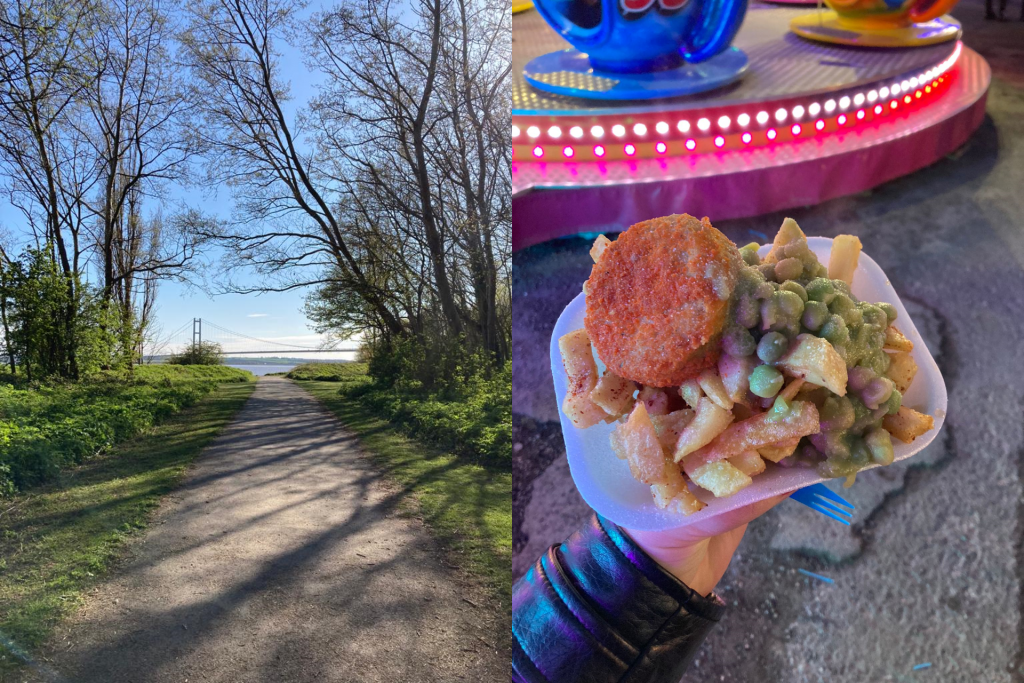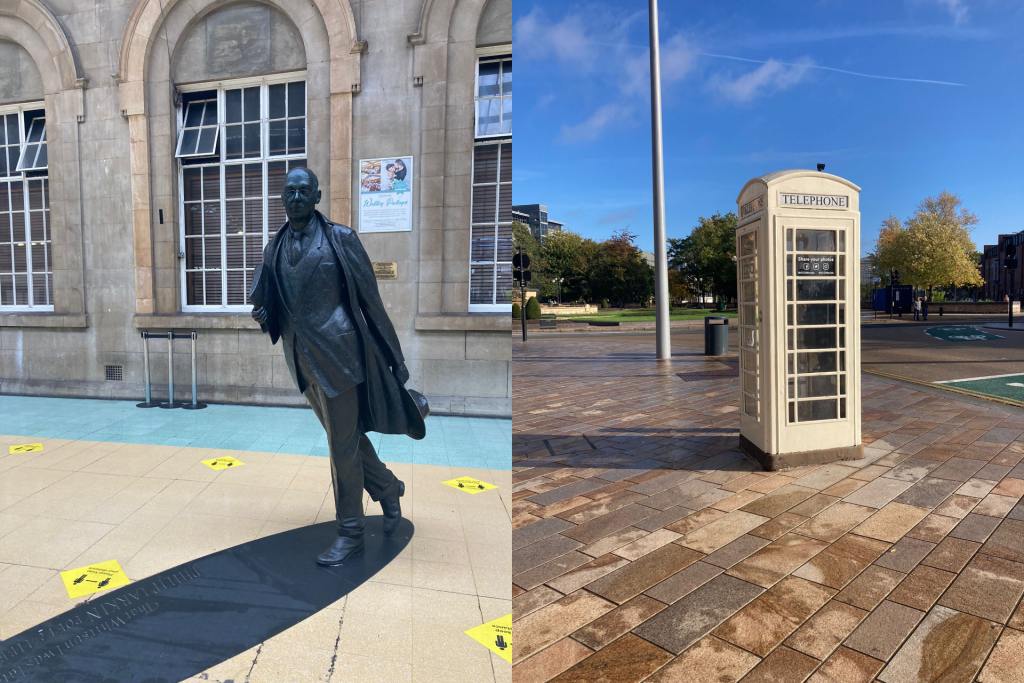
The Humber Bridge , and Hull’s famous Pattie, Chips and Peas (with plenty of Chip Spice).
Back in November, we sat down with a group of volunteers to collect their memories of Hull and chat about what the city means to them. Over cups of tea, photos from the archives, and a range of contemporary and historical maps, people told us stories of learning to swim in the city’s ‘slipper baths’, tales about locally-famous characters like Old Mother Riley and Chicken George, shared memories of taking ferries across to New Holland from Victoria Pier, and much more. When one attendee shared her own story of travelling across the Humber in the 1950s, how she told this story really struck us:
“Hull is abroad – its own climate, own fashion, own kingdom! I came via the great sea that divides the south bank from the north in early 1958. Convinced about abroad trip I asked many times where it was for years and was told never been abroad. 10 years on at about 12 years old I came back to New Holland with my parents. As I got on the ferry the question was answered.”
Coming to Hull in the 1950s was, she explained, like travelling to a foreign country – a different place with its own customs, cultures, and even weather. The story recalled the excitement (and sometimes confusion) that could come with a house move that took you from one side of the river to the other, especially in the days before the Humber Bridge. At the same time, we think this story speaks to something much bigger than holidays and local travel. For us, it also speaks to the distinctive way that people in Hull talk about the city and their lives here.
When we sat down to go through all of the material collected at our first workshop (more eighty post-it annotations to our maps, as well as several lengthy handwritten accounts and dozens of rich conversations), we noticed that lots of people talked about what could be collectively called Hull’s ‘distinctiveness’. Unusual facts, local trivia, and claims to Hull’s special status were common, from assertions that Hull’s Bransholme was the biggest council estate in Europe, notes on the importance of local food ‘delicacies’ like ‘American’ Chip Spice, and descriptions of the ‘very special light of the Holderness coast’. Like the attendee who stressed Hull’s ‘own climate, own fashion, own kingdom’, many people were keen to point out how Hull is different, how Hull is ‘other’, how Hull is exceptional.
Of course, anecdotes that are unusual or surprising crop up regularly in storytelling of all shapes and sizes. These narratives or nuggets of information are often easier to remember and assumed to be more interesting and exciting for audiences and readers. But in Hull, they are also very much part of the wider discourses in which the city is discussed. Take for instance, these quotes from famous poet Philip Larkin (who lived in the city for many years), often-repeated and taken as true reflection of the character of the city:
“It is a bit on the edge of things, and I rather like being on the edge of things.’
Channel 4, 2003
“People are slow to leave it, quick to return. And there are others who come for a year or two, and stay a lifetime, sensing that they have found a city that is in the world, yet sufficiently on the edge of it, to have a different resonance.”
Foreword, A Rumoured City: New Poets from Hull (1982)
The idea of a ‘different resonance’ appears again and again in cultural and political representations of the city, at least locally. And it can be seen in more everyday expressions of identity and celebrations of local pride too: Hull’s unique cream telephone boxes; the sell-out success of Friends on Every Street’s Pattie Butties t-shirts and social media campaigns; public art dedicated to local dialect like ‘larking out’, ‘tenfoots’, ‘croggies’, being ‘mafting’ or ‘nithered’, ‘farvs’ and ‘narns’. We could go on and on with examples.

A statue of Philip Larkin, Hull Paragon Station, and one of Hull’s famous cream telephone boxes.
In the introduction to Hull: Culture, History, Place, published during Hull’s year as UK City of Culture in 2017, authors David Atkinson, Briony McDonagh, Sarah McKeon, Elisabeth Salter, David J. Starkey and Martin Wilcox wrote about Hull as ‘a distinctive city’ with its own ‘idiosyncratic character’. The City of Culture programme itself undoubtedly magnified the ways in which Hull understood itself as different, with its requirements to celebrate specific local cultures and narratives (in an article on Hull 2017, the British Council described CoC as ‘a chance to celebrate a city’s unique qualities and open its cultural life to the rest of the world’), as well as its emphasis on self-reflection among participants and audiences. Yet Hull continues to understand and express itself as a different place five years on: one example can be seen in Hull City Council’s branding of its new maritime heritage project, ‘Hull: Yorkshire’s Maritime City’, said to promote Hull’s ‘unique spirit and sense of place’. And, even more importantly for us, these discourses also have a longer history that far predate the twenty-first century. Popular claims that Hull was secretly the ‘most badly bombed city outside London’ during the Second World War have endured for decades, and similarly speak to a self-perception that Hull is an exceptional place, a unique place – and one that other people (outside the city) just don’t know about.
Going forward, as well as tracking the ways in which Hull talks about itself, we want to understand more about why the city talks in the way that it does. Claims to fame and local novelties say less about the topics they touch on than about a city that sees itself as often overlooked, sometimes notable, and always different. So, why does the city talk like this? Where do the narratives that shape Hull’s sense of place come from? What does telling these stories do? And are they really, truly unique? All cities draw on the past to construct a sense of identity, and must attempt to define themselves to sustain a workable sense of place. But in Hull a specific sense of ‘otherness’, a sense of on-the-edge exceptionality, is clearly integral to how influential ‘place-makers’ and ordinary people characterise the city, and perhaps themselves within it too. These are themes and questions that we’ll keep exploring over the course of our project and in future blog posts.
Explore more of the stories we’ve collected so far here.